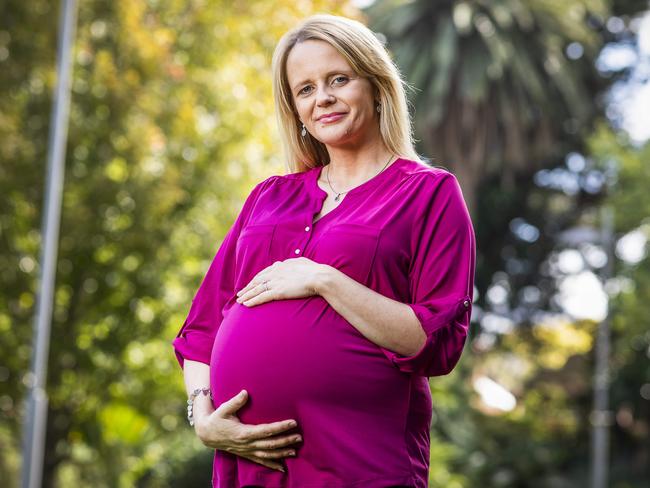How women can make their pregnancies normal throughout coronavirus pandemic
Pregnant women are being encouraged to remain calm throughout the virus pandemic and continue their medical appointments without fear. Here’s why.
NSW Coronavirus Hibernation
Don't miss out on the headlines from NSW Coronavirus Hibernation. Followed categories will be added to My News.
- Australia’s stage 3 lockdown: How long it must last
- New Aussie booze restrictions to control stockpiling
Pregnant women might be feeling cheated out of sharing their joy with family and friends because of the coronavirus lockdown.
But experts say they can be reassured their health and of their baby is at no increased danger.
COVID-19 is not believed to be harmful to unborn babies, but it is sensible for pregnant women to take extra care, according to leading gynaecologist Vijay Roach.
However, those undergoing IVF have been left in limbo by restrictions on elective procedures.

Royal Australian and New Zealand College of Obstetricians and Gynaecologists (RANZCOG) president Dr Roach said pregnant women with the virus did not become more unwell than anyone else.
“It is expected that the large majority of pregnant women will experience only mild or moderate cold/flu like symptoms,” Dr Roach told HiberNation.
“For women who are trying to conceive, or who are in early pregnancy, there is no evidence to suggest an increased risk of miscarriage with COVID-19.
“Woman should remain reassured, given our extensive knowledge of the impact of the effect of other respiratory viruses, that there is currently no evidence that COVID-19 will harm your baby or cause abnormalities.”
MORE NEWS
New private hospital deal to get more COVID-19 beds
We’re all in this together: A coronavirus novel
10 signs that your dog is sick
IVF specialist Lynn Burmeister said women were still keen to get pregnant “but there is much uncertainty and things are changing daily”.
The Federal Government has banned all elective surgery except category one and the top band of category two, and Dr Burmeister said there was a debate over where IVF fitted in.
At this stage, low-risk cases are proceeding.
Younger patients in their early-30s who want their eggs frozen are delaying the procedure, but she said older women had more urgent cases.
“If you’re 40 years old, this might be your last chance at IVF,” she said.
Dr Burmeister agreed the coronavirus was not shown to pose any risk for pregnant women in terms of congenital abnormalities or the risk of miscarriage.
She said based on available evidence, there was no risk of transmission to the foetus via the placenta or breast milk but there was a very small risk of preterm labour.
RANZCOG advises pregnant women to proceed with antenatal investigations, ultrasounds, and maternal and foetal assessments.
Cindy Davenport, midwife and director of Nourish Baby, is offering online prenatal classes for pregnant women and their partners.
“Be assured you can still access information, you can still learn,” she said.
Ms Davenport said many pregnant women were worried and anxious.

“They are feeling quite deflated and cheated out of sharing this with family and friends. But they can still FaceTime people,” she said.
Ms Davenport said pregnant women should be reassured “the system isn’t falling over – it’s still working well”.
But she said women with low-risk births might leave hospital six to 12 hours after giving birth.
Choreographer Katie Ditchburn, 40, is 31 weeks pregnant and due to give birth.
“It’s been very interesting being pregnant through this pandemic,” she said.
“Education has been important and we are being very careful.
“When people around you are freaking out, sometimes it’s when you are most calm.”

